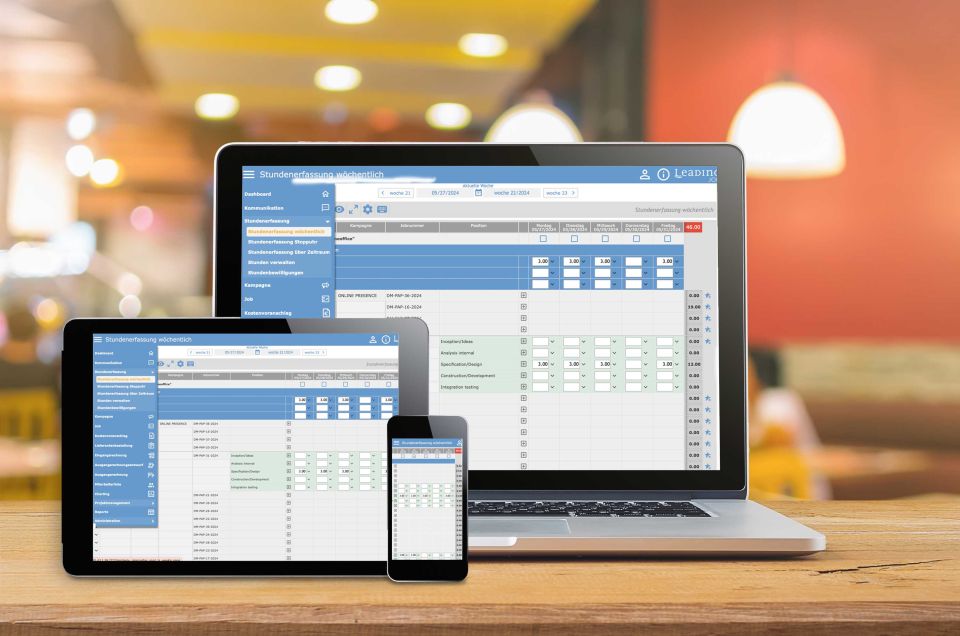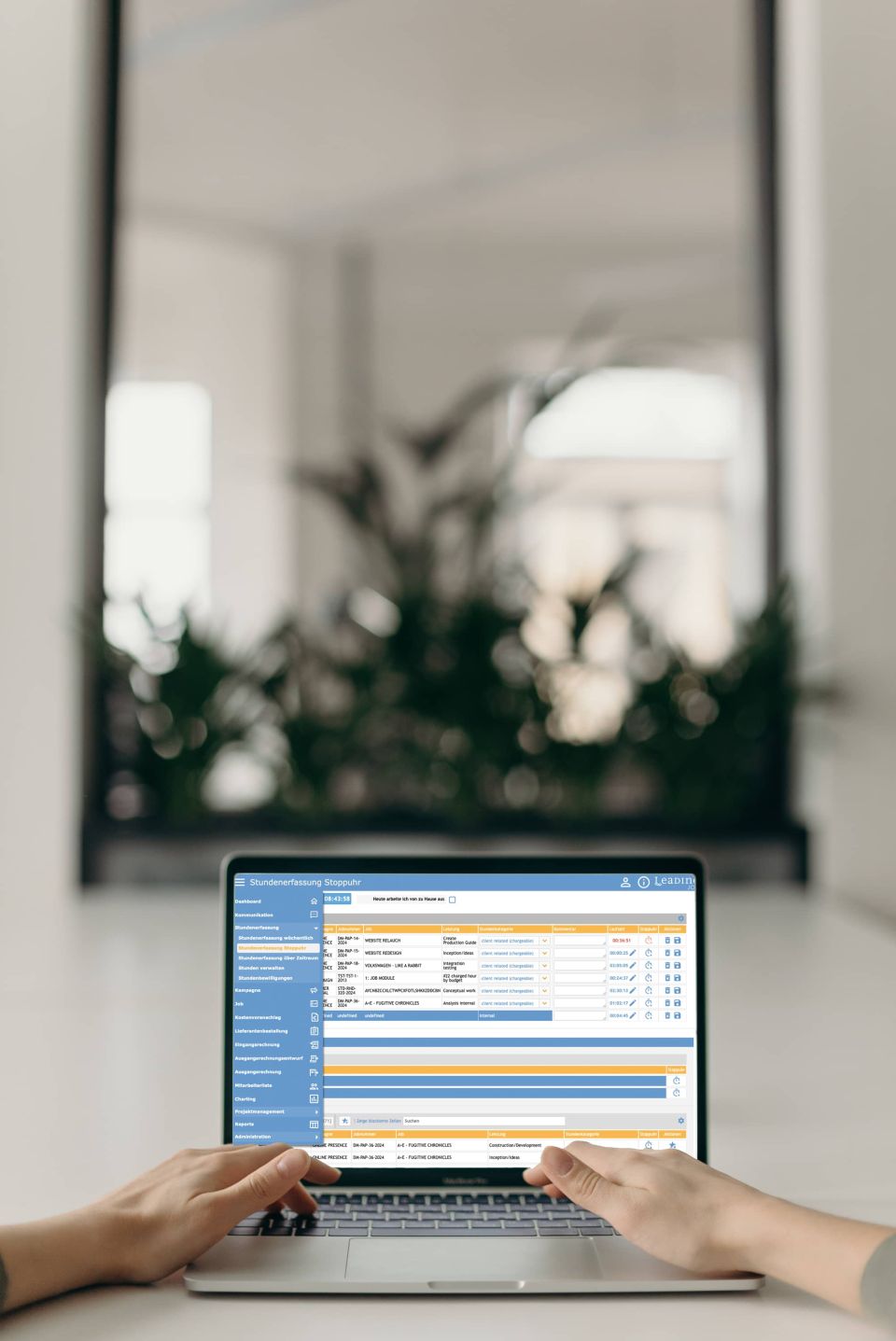Time Tracking the Easy Way: Tools and Tips for Employers
Time tracking is a key issue for companies and agencies, particularly with regard to legal requirements and operational efficiency. With increasing digitalisation and growing awareness of employee rights, the obligation to track working hours is becoming more and more important. But how do you implement time tracking correctly? What are the employers' obligations? And how do you ensure efficient and legally compliant time tracking in your company?
This guide provides you with all the important information you need to know about the obligation to record working hours in Germany, Austria and Switzerland. We clarify what the requirements are, how a reliable system can be set up and what agencies need to consider when recording the hours worked.

Why is Time Tracking so Important?
Time tracking protects both employers and employees. For employees, it creates transparency regarding the actual hours worked and enables them to observe the prescribed rest periods. For employers, it is a tool for fulfilling legal obligations and avoiding potential violations of occupational health and safety laws.
In particular, compliance with the maximum daily working hours is important to avoid violating the Working Hours Act. This concerns, for example, regulations on Sundays and public holidays, when employees may not, in principle, be employed, unless certain exceptions apply.
Legal Requirements for Time Tracking
The legal requirements for time tracking differ in Germany, Austria and Switzerland, but have similar basic principles.
Time Tracking in Germany
In Germany, the Working Hours Act (ArbZG) regulates the most important aspects of working hours and how they are recorded. According to § 16 ArbZG, employers are obliged to record the working hours of their employees, especially if the daily working hours exceed the regular working hours of 8 hours. This legal requirement serves to protect workers and to safeguard employee rights.
In addition, the obligation to record time was strengthened by the ruling of the Federal Labour Court (Az 1 ABR 22/21) of September 2022. This ruling clarified that employers are obliged to set up a reliable and accessible system for recording hours worked, which also documents the start, end and duration of working hours.
Time Tracking in Austria
In Austria, the Working Hours Act (AZG) regulates the recording of working hours. Employers are obliged to keep a record of their employees' working hours to ensure that the statutory maximum working hours are adhered to. Here, too, the daily working hours may generally not exceed 8 hours, although under certain conditions an extension to 12 hours is possible.
The AZG stipulates that employers must record the start, end and duration of working hours. There are specific regulations for overtime and flexible working models such as flexitime. The purpose of recording working hours is to protect employees and ensure that rest periods are observed. In Austria, there are also industry-specific regulations that apply, for example, to the healthcare or transport sectors.
Time Tracking in Switzerland
In Switzerland, the Labour Act (ArG) regulates the obligation to record working hours. Here, employers are also obliged to record the working hours of their employees. A special feature of the Swiss regulations is the distinction between employees with normal working hours and those with trust-based working hours, where no detailed recording of working hours is necessary.
In Switzerland, employees are not allowed to work more than 45 hours per week (in some industries, up to 50 hours are allowed). Again, overtime that exceeds these limits must be recorded and remunerated accordingly or compensated by time off. The Federal Office for Labour and Social Affairs (BAS) monitors compliance with working time regulations, and violations can lead to sanctions.
In all three countries, employers are therefore obliged to keep records of working hours in order to ensure the protection of employees and to ensure that rest periods and legal requirements regarding the maximum duration of working hours are observed.
What do Employers Need to Consider? A DACH Overview
Employers should familiarise themselves with the legal requirements for recording working hours at an early stage. In addition to the legal requirements, there are also industry-specific regulations that can influence the recording of working hours.
We have summarised the most important points for you in a table.
| Germany | Austrua | Switzerland | |
|---|---|---|---|
| Legal basis | Arbeitszeitgesetz (ArbZG) | Arbeitszeitgesetz (AZG) | Arbeitsgesetz (ArG) |
| Obligation to time tracking | Employers must record the start, end and duration of working hours (judgment of the Federal Labour Court, BAG Az 1 ABR 22/21) | Employers must keep records of daily working hours and overtime. | Employers must record working hours; detailed time recording is often not required for trust-based working hours. |
| Maximum daily working hours | 8 hours (max. 10 hours with compensation) | 8 hours (can be extended to 12 hours) | 9 hours (depending on industry) |
| Maximum weekly working hours | 48 hours (with compensation within 6 months) | 40 hours (extensions to up to 60 hours per week possible) | 45 hours (50 hours in certain industries) |
| Rest period between working days | 11 hours | 11 hours | 11 hours (can be reduced to 8 hours, e.g. for shift work) |
| Overtime | Must be recorded and remunerated or compensated | Must be recorded and remunerated or compensated | Must be recorded and remunerated or compensated |
| Senior executives | Exempted from time tracking | Exempted from time tracking | Exempt from time tracking, as are trust-based working hours employees |
| Sundays and public holidays | Arbeit grundsätzlich verboten, Ausnahmen möglich | Arbeit grundsätzlich verboten, Ausnahmen möglich | Arbeit grundsätzlich verboten, Ausnahmen möglich |
| Industry-specific exceptions | Yes, e.g. healthcare, hospitality industry
|
Yes, e.g. healthcare, hospitality industry | Yes, e.g. healthcare, hospitality industry |
| Regulatory authority | Bundesministerium für Arbeit und Soziales (BMAS) | Arbeitsinspektorat | Bundesamt für Arbeit und Soziales (BAS) |
| Penalties for non-compliance | Fines, sanctions | Fines, sanctions | Fines, sanctions |
Reliable Time Tracking Systems
Modern software solutions offer companies the opportunity to organise their time tracking simply and efficiently. Electronic systems make it easy to document the start, end and duration of working hours. These systems are often also available in mobile versions, enabling precise recording of working hours even when employees are working from home or under flexible working arrangements.
A reliable and accessible system like this should not only be easy to use, but also meet data protection requirements. Employers must ensure that the data is stored securely and used only for its intended purpose.

Time Tracking with LEADING Job: Your Advantages at a Glance
The agency software LEADING Job offers comprehensive features that ensure companies meet the legal requirements for time tracking in Germany, Austria and Switzerland.
- Legally compliant time tracking: LEADING Job enables the precise documentation of the start, end and breaks in working hours, which ensures compliance with legal requirements.
- Time tracking and project time tracking: Recording of all working hours, including non-project-related activities and home office days, as well as accurate recording of productive hours at the project level, differentiated according to billable and non-billable services.
- Flexibility in working time models: The software supports various working time models, such as full-time, part-time and flexitime, in order to meet the different requirements of the countries.
- Holiday and absence management: LEADING Job enables comprehensive management of holiday and absence times
- Automatic overtime and extra hours calculation: The software is able to automatically calculate overtime and extra hours and create the corresponding records.
- Reminder function: A two-stage reminder function ensures that employees record their working hours in a timely manner. First, they receive an email notification, followed by an automatic warning to the responsible person if hours are not recorded.
- Documentation and audit trail: LEADING Job logs changes, deletions and releases of working hours, which enables seamless tracking of all activities and supports compliance.
- Compliance features: A release workflow for working hours ensures the four-eyes principle, which is a central requirement for listed companies subject to SOX guidelines.
- Seamless data exchange: The software enables the simple import and export of time tracking data to other systems and offers interfaces to time clocks and keycard systems to automatically track attendance times.
- Reporting and evaluation options: With the time tracking reports in LEADING Job, you have reporting tools at your disposal that enable a transparent evaluation of working hours.
Schedule Your Free Consultation for Professional Time Tracking
Find out how LEADING Job can help you to record working hours in your company accurately and effortlessly. In a free and non-binding appointment, we will show you how our solution simplifies your time recording and how it can be optimally tailored to your operational requirements.
Optimise your processes and keep track of all working hours – make an appointment now and benefit from our professional advice!
